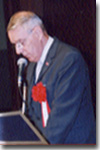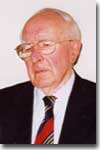Speech by Dr. William Gerard Beasley, C.B.E.(U.K)
(Emeritus Professor of the History of the Far East, University of London)

Ian Nish
Due to his health condition, Dr. Ian Nish, who is one of his friends and The Japan Foundation Award recipient in 1991, is present on behalf of Dr. Beasley.
(Ian Nish)
I am Ian Nish, Professor Emeritus of the University of London. Since I was a student under the guidance of Prof. Beasley, I have been studying Japanese history. After graduating, I became a colleague of Prof. Beasley, at the University of London, and became a member of Prof. Beasley's seminars. Since that time, to date, we have been close friends. Prof. Beasley published a very detailed research account on Asia toward the end of the Edo era and the Meiji Restoration, which is his specialty. After retirement, he has also written about youths who were sent to Europe for studies from Choshu. This year, his past academic papers were compiled and published as his collected writings. Please allow me to convey Prof. Beasley's message on his behalf:

William Gerard Beasley
"It is a great honor to have been awarded the Japan Foundation Prize for the year 2001. I feel this all the more, because I have long regarded the work of the Japan Foundation with admiration and respect; it provides a means not easily available in other ways by which foreign students and teachers wanting to improve their knowledge of Japan, may be put in touch with Japanese individuals, books and institutions able to help them. This is something well worth doing.
When I started my career, there was no such organization to which I could turn. It was in October 1947 that I was appointed lecturer in Japanese history at the School of Oriental and African Studies in the University of London. My qualifications, I think, left something to be desired. I had a degree in history, it is true; but it was a degree in British and European history. When I was in the Royal Navy, I had learned Japanese in the US Navy language school in Boulder. But this was wartime duty, of which I did not then expect to make any further use. Equally, the six months I spent in Japan during the first six months of the occupation, had been devoted almost entirely to naval business. I had never at any time attended a course in Japanese history.
Looking back, I do not believe that my early lectures were very good. The books needed to prepare them were quite scarce in Britain, and scattered in several different libraries. There were no useful guides to them, no computer catalogues. Relevant works in Japanese were even harder to find. One had to go to each library that seemed likely to have them, asking questions, and the answers were not always helpful or well informed. The British Museum, for example, it incorporated what is now the British Library, certainly had the largest collection of Japanese works; but it did not have a librarian who could read Japanese. Discovering what was available was therefore difficult and time-consuming. And that was true for material for research and teaching as a whole. Work became a kind of treasure hunt. What you could do depended on what you could find.
In my case, these problems were largely overcome after 1950. In that year, I was granted sabbatical leave together with finance to make a journey to Japan. On arrival in Tokyo, I met Vere Redman, then information counselor at what would shortly become the British Embassy. Through his good offices, I was admitted to the Shiryo Hensanjo at Tokyo University, my first direct contact with Japanese academic life, made at the highest level.
The staff of that institute were enormously helpful. They gave me an expert introduction to the use of Japanese materials, discussed problems of historical methodology with me, and helped me to meet Japanese historians elsewhere in Japan. By the end of the year, my research had made exceptional progress, as had my ability to teach Japanese history as a whole. I had bought many books, they were very cheap at the time, and sent home lists of books for my university library to buy. I had also made friends among Japanese scholars to whom I knew I could turn for advice in future years. Teaching Japanese history in London at last seemed a practical possibility.
This was life before the Japan Foundation, one might say. It would certainly been much easier had the Foundation existed at that time. Even so, I thoroughly enjoyed it, just as I have enjoyed the study of Japanese history ever since. For this reason, while I accept the Japan Foundation prize for 2001 with very great gratitude, I also feel a touch of guilt about it. I am being rewarded, after all, for doing the things I have enjoyed for the greater part of my career."
That is the message from Prof. Beasley. Thank you very much for your kind attention.
- What We Do Top
- Arts and Cultural Exchange [Culture]
- Japanese-Language Education Overseas [Language]
- Japanese-Language Education Overseas [Language] Top
- Learn Japanese-language
- Teach Japanese-language
- Take Japanese-Language Test
- Know about Japanese-language education abroad
- The Japanese-Language Institute, Urawa
- The Japanese-Language Institute, Kansai
- Japanese-Language Programs for Foreign Specified Skilled Worker Candidates
- Japanese Language Education for Japanese Children Resident Overseas and for the Descendants of Migrants
- Archives
- Japanese Studies and Global Partnerships [Dialogue]
- JF digital collection
- Other Programs / Programs to Commemorate Exchange Year
- Awards and Prizes
- Publications
